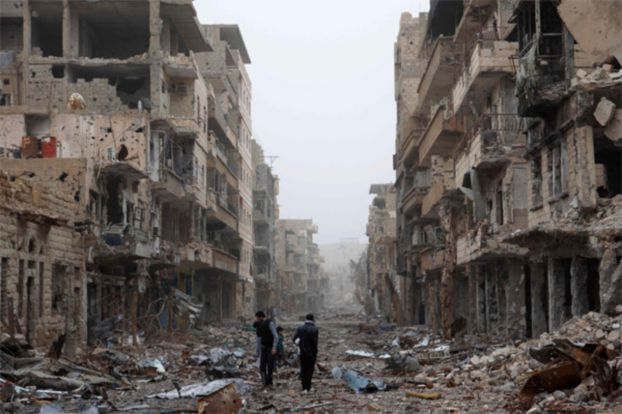Opinion/Why the Rebuilding of Syria Isn’t Going to Happen
تحليل من الهآرتس لديفيد روزنبرج لهذه الأسباب لن تتم أعادة الإعمار في سوريا
David Rosenberg/Haaretz/January 25/19
The Russians hope to recruit the West for the $250 billion-plus effort, but it’s a non-starter and Assad’s allies can’t do it alone.
In the film “The Mouse that Roared,” the bankrupt Grand Duchy of Fenwick declares war on the United States in expectation that its inevitable defeat will open up American pockets for post-war reconstruction.
That political farce had some basis in reality. When the movie was made in 1959, America regarded itself as the leader of the free world, and had a deep sense of global responsibility and the money to act on it.
Flash forward 60 years, and a variation on the theme is occurring as the Syrian civil war is supposed to be winding down. Syria wasn’t defeated by the U.S. – quite to the contrary, with the help of its allies, Bashar Assad’s regime defeated the Western-backed forces trying to topple him – but the West is being lobbied to pay to rebuild the country anyhow.
Syria is broke and its Russian and Iranian allies haven’t the financial resources to cover the cost, which could run upwards of $250 billion. Russia is leading a campaign to lure Europe (and with some luck maybe even the U.S.) by marketing reconstruction as a way of ending the suffering of the Syrian people, bringing the refugees back home, and ensuring political stability.
The campaign is cynical and its assumptions are false. The war is still on and the suffering will continue for the foreseeable future. Assad has shown little interest in allowing the refugees to return. Rebuilding won’t do very much except help solidify his rule and reward his cronies with fat contracts and payoffs.
But by themselves, cynicism and lies are not why the Russians stand no chance of succeeding. Their real problem is that no one who has the resources to rebuild Syria has a compelling interest to overlook the untruths.
Sand and death
It’s no longer 1959. America still has the money (after all, it’s spending $45 billion a year in Afghanistan alone), but Donald Trump is no George Marshall of the Marshall Plan. Trump would love to cut Afghanistan loose and pare back America’s other financial commitments abroad.
Trump’s vision of America is not one of a responsible world leader but as an enormously big business making deals. As he told the cabinet about why he wants to bring U.S. troops back from Syria, “We’re not talking about vast wealth. We’re talking about sand and death.”
As a business proposition, Trump is correct about Syria. It was an economic sinkhole before the war, and the opportunities to do any profitable business there remain virtually nil. Anyhow, the Kurds control all the country’s oil in the northeast, and the Russian and Iranians have first dibs on the most lucrative contracts.
Well, then what about Europe? European leaders would be glad for the refugees that flooded the continent in 2015-16 to return to a rebuilt Syria. If they believed Assad was ready to welcome them back, they might even be prepared to hold their noses and help.
But Assad doesn’t even want it. He has signaled he would prefer a smaller, more politically pliable Syria over one crawling with Western contractors and aid officers and suspect Sunnis. “We lost the best of our youth and our infrastructure,” he told a 2017 conference. “It cost us a lot of money and a lot of sweat, for generations. But in exchange, we won a healthier and more homogeneous society in the true sense.”
Like the U.S., the Europeans are holding out for a political transition in Syria, which everyone knows isn’t going to happen. Assad didn’t fight a year an eight-year civil war at the cost of 500,000 dead and 12 million refugees so he could hold elections.
And the Saudis? That’s Trump’s preference. As he said in a little noticed tweet last month, “Saudi Arabia has now agreed to spend the necessary money needed to help rebuild Syria, instead of the United States. See? Isn’t it nice when immensely wealthy countries help rebuild their neighbors rather than a Great Country, the U.S., that is 5000 miles away. Thanks to Saudi A!”
This is a typical specimen of Trump politics – an admixture of ignorance, if not outright lies, unmoored from any strategy.
The Saudis themselves had no idea what Trump was talking about after he made the claim. They are locked in a bitter cold war with Iran and aren’t about to send tens of billions of dollars to a Tehran ally. If Assad rids his country of Iranians, the Saudis might come up with some money, but his military position remains too insecure to trade Iranian fighters for Saudi dollars.
In any case, the Saudis don’t spend their money in the carefree way they once did, and they have financial commitments to countries in which they have a strategic interest, like Egypt, Jordan and Yemen (which fits the “Mouse that Roared” model perfectly).
China is another candidate, but an unlikely one. In contrast to Western countries, Beijing isn’t going to set unpleasant conditions like a political transition in Syria, respect for human rights and an end to corruption.
But their political involvement in the Middle East is almost nil. The only reason Syria might interest them is for the economic benefits, and like Trump, they know there are few to be found in Syria. Beijing would rather invest in countries with substantial amounts of oil and gas.
In the movie, the Grand Duchy of Fenwick accidentally wins the war and gets American aid to boot. But that’s Hollywood, and Damascus is 7,500 miles away.



















